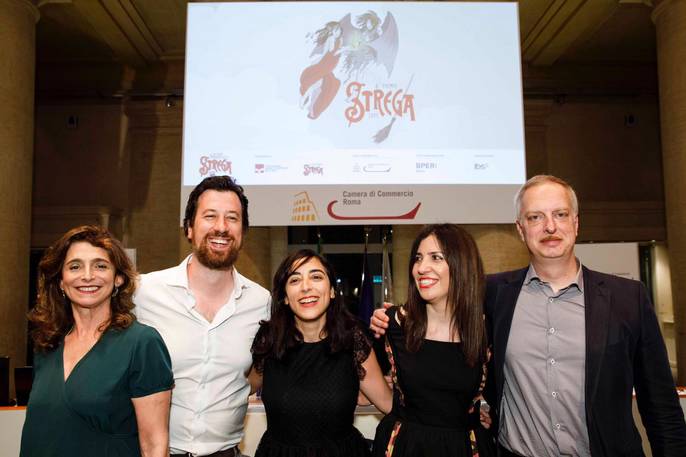


“I’m happy that many more Italians will read this book especially because they will get to learn our history with the hope that it won’t repeat itself, even if in different forms,” commented Scurati while sipping a bottle of Strega [2] to celebrate his victory, which had been widely anticipated over the past weeks.
The Neapolitan writer had already made it to the Strega Prize [3] finals with “Il bambino che sognava la fine del mondo” (Bompiani 2009) and with “Il padre infedele.” (Bompiani, 2013) The first time he lost by one vote against the novel “Stabat Mater” by Tiziano Scarpa, the second time by five votes against “Il desiderio di essere come tutti” by Francesco Piccolo.
This year, Scurati triumphed, obtaining 228 votes. Second place went to Benedetto Cibrario for his “Il rumore del mondo” (Mondadori), 127 votes, and third place to Marco Missiroli with “Fedelta” (Einaudi), 91 votes. Claudia Durastanti came in fourth place with “La straniera” (La nave di Teseo), 63 votes, and Nadia Terranova was fifth with “Addio fantasmi” (Einaudi), 47 votes.
The book begins in 1919, the year in which Mussolini founded the movement “Fasci italiani di combattimento,” and ends with his 1925 speech, when the fascist dictatorship started. “The advent of fascism,” Scurati explained, “is proof that a man’s charisma lies in his physical appearance, in speeches, in propaganda. Mussolini was the ideal man for Italy in that period. At that time, society did not trust politicians and thought they were corrupt. He represented the Italian citizen.”
The 2019 Premio Strega is not the usual biography, in fact, the narrator’s voice is that of Mussolini himself. The author, through a narration free from ideological prejudice, proposes a reformation of antifascim, combatting it and disassembling it from the inside. In Scurati’s book, it’s the fascist leader himself who recounts/describes Italy’s identity crisis, its desire for a better future. Mussolini manages to transform this discontent into dictatorship by promising to bring Italy back to the glory of the Roman Empire. Thus, the writer guides us through the delirious mind of the man who, more than anyone, marked the history of Italy.
A documented novel, which Scurati wanted to dedicate to those men, “our grandfathers and our fathers,” who were initially fascinated by fascism and then became its victims or strong opposers. The work is only the first volume in a trilogy, necessary for rewriting history from the inside, capturing the pathos of those tragic years to present them as contemporary current events, “So that the reader becomes antifascist at the end and not at the beginning of the book.”
The winner, in his acceptance speech, also thought of the young people for whom Mussolini is no longer a tabu. In times during which there are no more witnesses and accounts from those who experienced that historical period, Scurati fills this want and the distance separating us from those events, forcing us all to take on the task of helping new generations to form a complex opinion.
Source URL: http://newsite.iitaly.org/magazine/focus/art-culture/article/m-antonio-scurati-takes-2019-strega-prize
Links
[1] http://newsite.iitaly.org/files/strega3jpg
[2] https://en.wikipedia.org/wiki/Strega_(liqueur)
[3] https://en.wikipedia.org/wiki/Strega_Prize